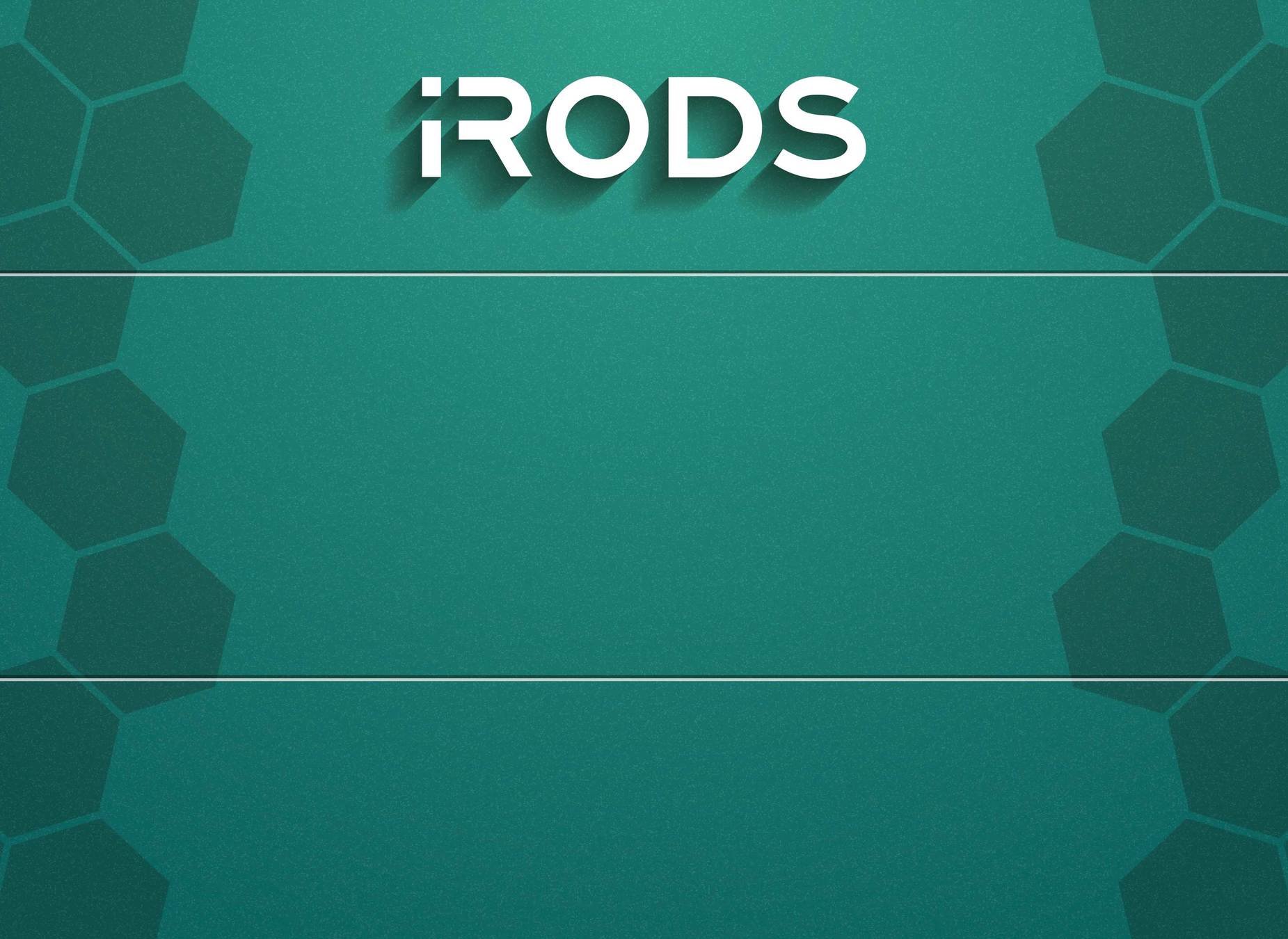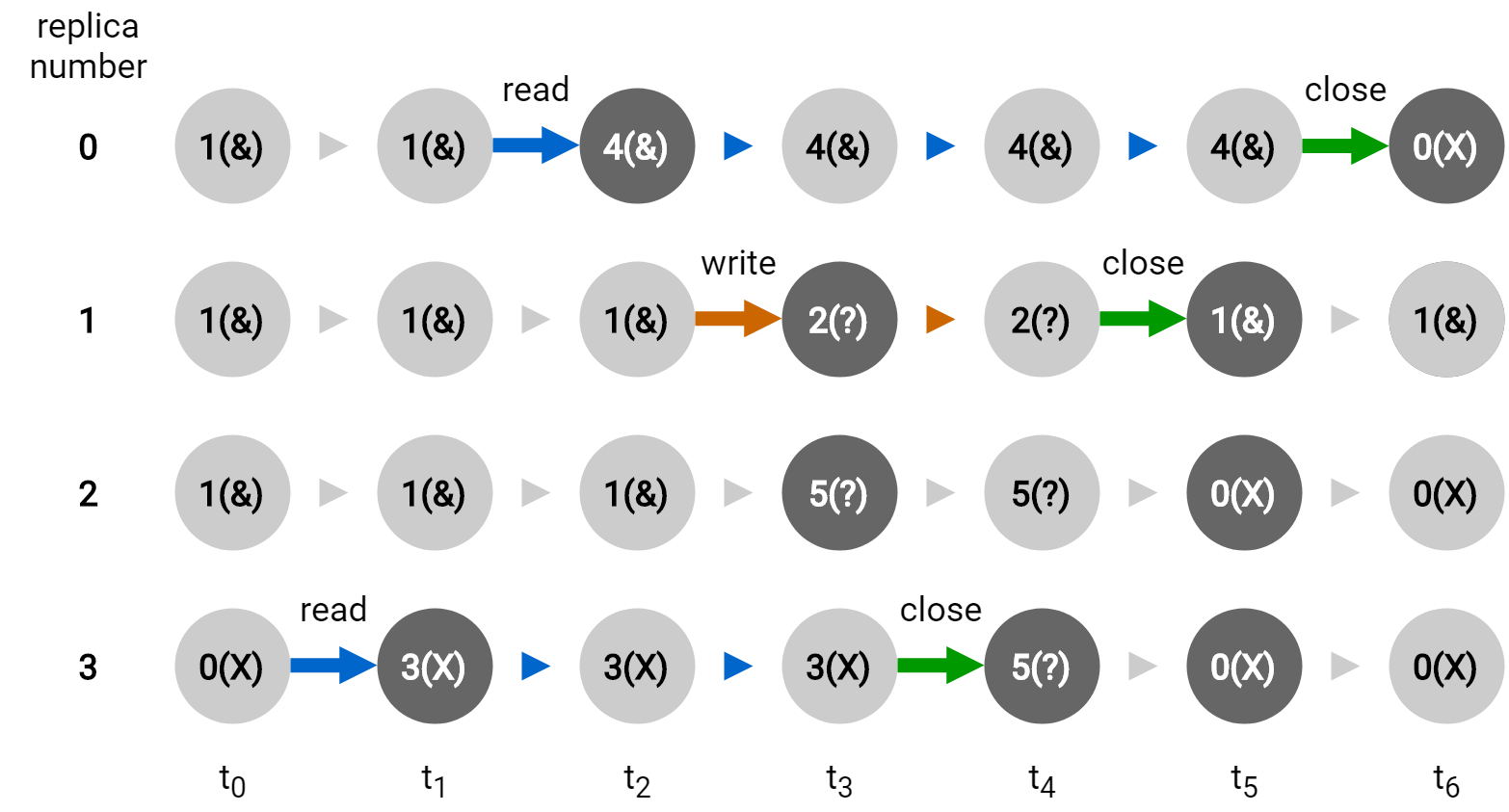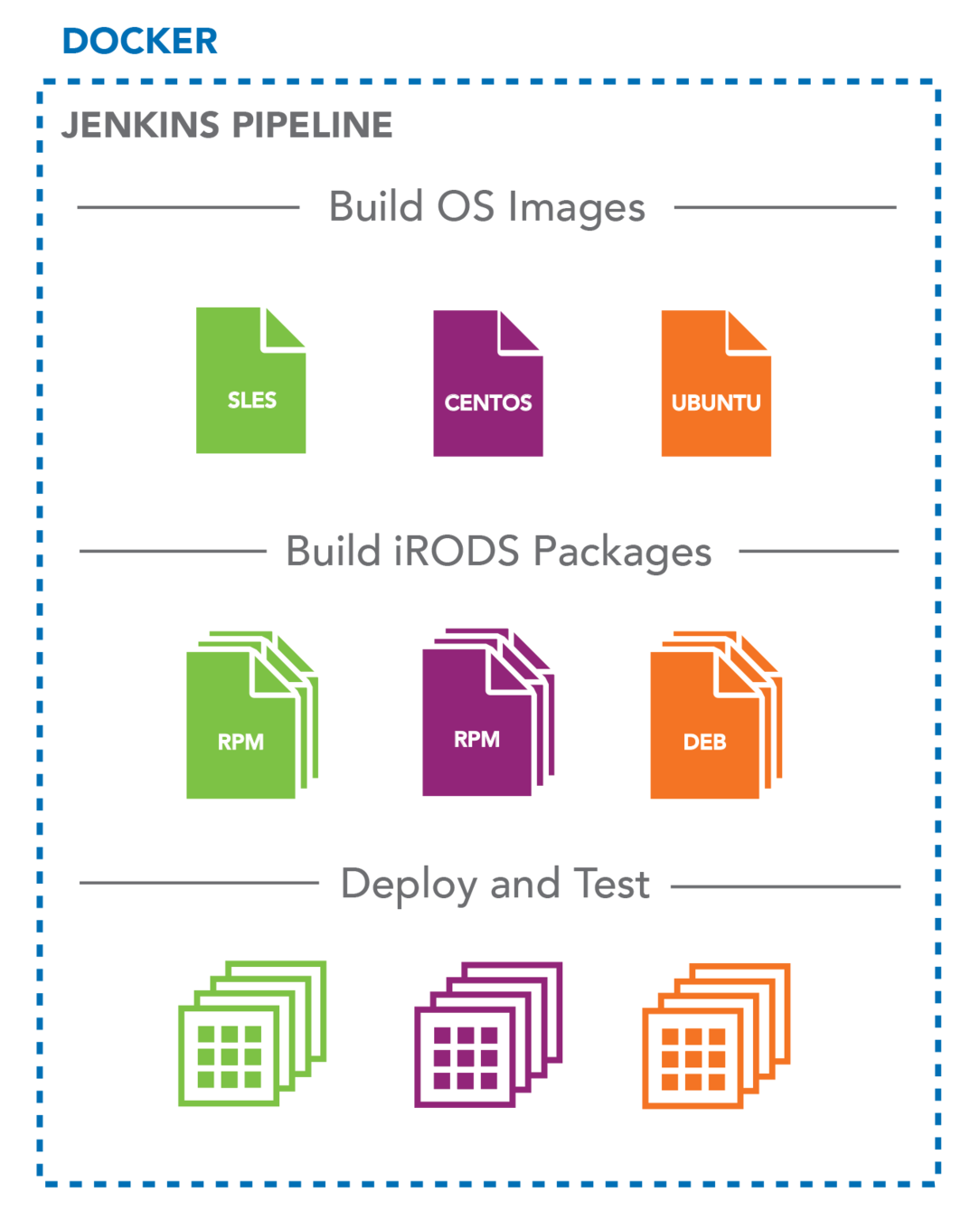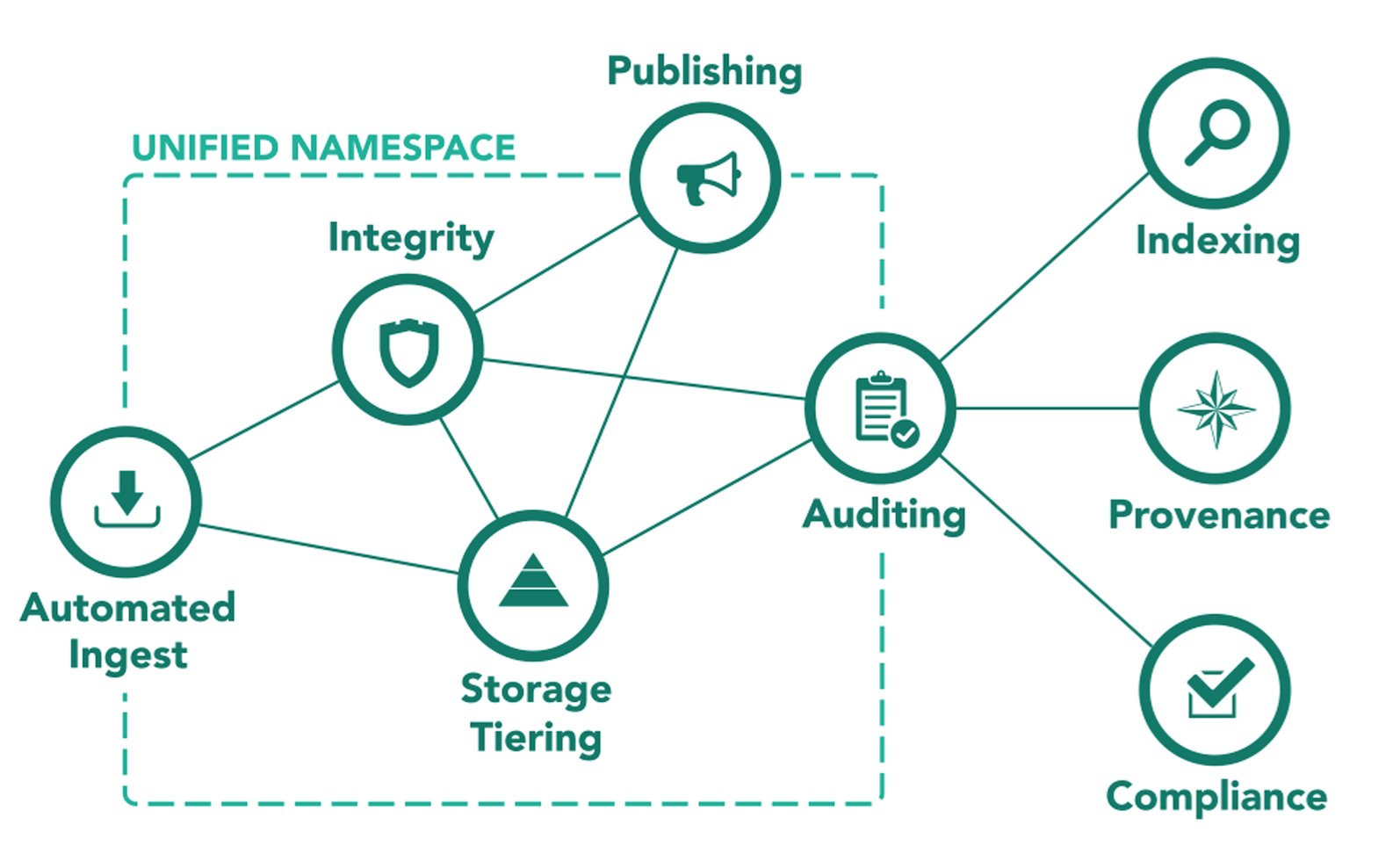Technology Update
June 9-12, 2020
iRODS User Group Meeting 2020
Virtual Event
Terrell Russell, Ph.D.
@terrellrussell
Chief Technologist, iRODS Consortium
Technology Update

In The Last Year
| iRODS Release | Issues Closed |
|---|---|
| 4.2.7 | 58 |
| 4.2.8 | 122 |

~/irods $ $ git shortlog --summary --numbered 4.2.6..4.2.8
82 Kory Draughn
36 Alan King
13 Terrell Russell
13 d-w-moore
12 Jaspreet Gill
10 Jason Coposky
4 Justin James
1 Ben Keller
1 John Thiltges
1 Matt Watson

In The Last Year
Plugins
- Python Rule Engine Plugin
- Storage Tiering Rule Engine Plugin
- Auditing (AMQP) Rule Engine Plugin
- Update Collection Mtime Rule Engine Plugin
- S3 Resource Plugin
- Kerberos Authentication Plugin
- Curl Microservice Plugin
- Hard Links Rule Engine Plugin
- Indexing Rule Engine Plugin
- Logical Quotas Rule Engine Plugin
- Metadata Guard Rule Engine Plugin
Clients
- Python iRODS Client
- Metalnx
- NFSRODS
- Automated Ingest Framework
- AWS Lambda for S3
Active Development Work
- iRODS 4.2.9
- iRODS 4.3.0
- Metadata Templates Working Group
- Authentication Working Group
- Parallel Transfer Engine
- Logical Locking
- Policy Composition
- Publishing Capability
- NetCDF microservices
- C++-based REST API
- Metalnx and Indexing
- NFSRODS
- Testing Infrastructure

Working Groups
Technology Working Group
- Goal: To keep everyone up to date, provide a forum for roadmap discussion and collaboration opportunities
Metadata Templates Working Group
- Goal: To define a standardized process for the application and management of metadata templates by the iRODS Server
- NIEHS / Data Commons
- Utrecht / Yoda
- Maastricht / DataHub+
- Arizona / CyVerse
Authentication Working Group
- Goal: To provide a more flexible authentication mechanism to the iRODS Server.
- SURF
- NIEHS
- Sanger
- CyVerse
- Utrecht

Philosophical Drivers
-
Plugin Architecture
-
core is generic - protocol, api, bookkeeping
-
plugins are specific
-
policy composition
-
-
Modern core libraries
-
standardized interfaces
-
refactor iRODS internals
-
ease of (re)use
-
fewer bugs
-
-
-
Replicas as first class entities
-
logical locking
-
-
Consolidation of data movement
-
dstreams all on 1247
-

Last Year and Next Year

- Core Libraries
- Kory Draughn
- Logical Locking
- Alan King
- Python Query Facilities
- Daniel Moore
- Build and Test
- Jaspreet Gill
Last Year's C++ Libraries
-
filesystem
- server, plugins, icommands
-
iostreams
- server, indexing, S3 resource, icommands
-
thread_pool
- delay execution server, S3 resource
-
connection_pool
- delay execution server
-
query
- server, indexing, publishing, storage tiering
-
query_processor
- delay execution server, storage tiering

Goal: Provide standardized interfaces that simplify common iRODS tasks
This Year's C++ Libraries: It's getting easier!
Nine new libraries:
-
key_value_proxy
- Provides a map-like interface over an existing keyValuePair_t.
-
lifetime_manager
- Guarantees that heap-allocated iRODS C structs are free'd at scope exit.
-
user group administration
- Simplifies management of iRODS users and groups.
-
shared_memory_object
- Simplifies access and management of shared memory.
-
with_durability
- A convenient retry mechanism for functions and function-like objects.
-
query_builder
- Enables query objects to be constructed lazily.
-
client_api_whitelist (server-side only)
- An interface for managing and querying the client API whitelist.
-
scoped_privileged_client (server-side only)
- Elevates the client's privileges for the duration of a scoped block.
-
scoped_client_identity (server-side only)
- Changes the client's identity for the duration of a scoped block.

New API Plugin
Atomic Metadata Operations API Plugin
Executes a list of metadata operations on a single object atomically.

Features:
- Supports data objects, collections, users, and resources
- Provides a future proof interface by accepting JSON as input
- Supported by the iRODS Filesystem library
- add_metadata(comm, path, container_holding_avus)
- remove_metadata(comm, path, container_holding_avus)
Example JSON Input:
{
"entity_name": "/tempZone/home/rods",
"entity_type": "collection",
"operations": [
{
"operation": "add",
"attribute": "iRODS",
"value": "is",
"units": "awesome!"
}, {
"operation": "remove",
"attribute": "ugm",
"value": "2019"
},
// ... More Operations ...
]
}
Library / API Examples
Examples on using these libraries can be found at the following repository:
Help us make them better!

Replicas vs. Data Objects: Why It Matters

Data Object: a logical representation of data that maps to one or more physical instances (Replicas) of the data at rest in Storage Resources
Replica: an identical, physical copy of a Data Object
from training: https://github.com/irods/irods_training/blob/master/beginner/irods_beginner_training_2019.pdf
Operations which deal directly with replicas have completely separate implementations for moving data. Operations dealing with data objects still need access to replica information.
All of this has consistency and performance implications for moving data. In reality, all of these operations should be and are identical:
Open replica, move data to replica, close replica
Solution: Make replicas a proper entity within iRODS
Data Movement and Replica Status

But replicas have their own problems...
- A replica's status is wrong the moment it is created
- Replicas are either good or stale, even if it is not at rest
Solution: Intermediate replica status for data not at rest
Replica status should always reflect what's in the catalog, there's only one way to move data, and can be surfaced with a standardized interface - great! And it's even mostly implemented!
...but what about concurrent operations on different replicas represented by a single data object?
Solution: Logical locking
Logical Locking (irods/irods#3848)

Value |
ils |
Status |
Description |
|---|---|---|---|
0 |
X |
stale |
- data at rest may not match catalog |
1 |
& |
good |
- data at rest matches catalog |
2 |
? |
intermediate |
- data is not at rest |
3 |
X |
read lock |
- allows open for read |
4 |
& |
read lock |
- allows open for read |
5 |
? |
write lock |
- locks out all opens for this replica |

0(X): stale
1(&): good
2(?): intermediate
3(X): read lock (stale)
4(&): read lock (good)
5(?): write lock
Pathological Concurrent Operation Scenario
logical path: /tempZone/home/alice/foo

t0: 4 replicas; 3 good, 1 stale
t1: r3 opened for read; r3->3(X)
t2: r0 opened for read; r0->4(&)
t3: r1 opened for write; r1->2(?), r2->5(?)
t4: r3 closed/finalized; r3->5(?)
t5: r1 closed/finalized; r1->1(&), r2->0(X), r3->0(X)
t6: r0 closed/finalized; r0->0(X)
Python Rule Engine Plugin - Improved General Query

from genquery import Query
def data_name_like (rule_args, callback, rei):
q = Query(callback,["COLL_NAME","DATA_NAME"],
"DATA_NAME like '{}'".format(rule_args[1]))
rule_args[:2] = q.first()
from genquery import row_iterator, AS_LIST
def data_name_like (rule_args, callback, rei):
q = row_iterator(["COLL_NAME","DATA_NAME"],
"DATA_NAME like '{}'".format(rule_args[1]),
AS_LIST,
callback )
rule_args[:2] = [row for row in q] [0]
Original, more verbose syntax in 4.2.5:
With improvements from Chris Smeele (Utrecht) in 4.2.8:
General Query facility provided by /etc/irods/genquery.py
The example below has:
-
two return columns, "COLL_NAME" and "DATA_NAME"
-
where clause matching DATA_NAME "like" a passed string variable
Python iRODS Client - General Improvements

import irods.keywords as kw
from irods.models import DataObject
from datetime import timedelta, datetime
with iRODSSession(...) as session:
q = session.query(DataObject.id) \
.add_keyword(kw.ZONE_KW,'otherZone') \
.filter(DataObject.modify_time > datetime.utcnow()-timedelta(seconds=3600))
for row in q: print( row[DataObject.id] )
from irods.column import In
from irods.models import User, Collection
query_results = [ u[User.name] for u in session.query(User) \
.filter(User.zone == 'myZone')
]
for coll in session.query(Collection.name) \
.filter(In(Collection.owner_name,query_results)):
print (coll)
"IN" operator
Queries can target federated zones
These new features are available in v0.8.3
Python iRODS Client - General Improvements

with iRODSSession(...) as session:
x = [ i for i in session.query(DataObject.id,Collection.name,DataObject.name)\
.filter( Like(DataObjectMeta.name, 'criterionX\_%'), DataObjectMeta.value < '4')\
.filter( Like(DataObjectMeta.name, 'criterionY\_%'), DataObjectMeta.value > '6')\
]
print(x)
This query involves a single column multiple times:
$ iquest "select DATA_ID, COLL_NAME, DATA_NAME where \
META_DATA_ATTR_NAME like 'criterionX\_%' and META_DATA_ATTR_VALUE < '4' and \
META_DATA_ATTR_NAME like 'criterionY\_%' and META_DATA_ATTR_VALUE > '6' "
The equivalent iquest can be seen here:
$ imeta qu -d 'criterionX_a' '<' 4 and 'criterionY_b' '>' 6
imeta provides a simpler usage if the attribute names are known:
iRODS Build and Test - History

July 2011
-
Python → Node.js → RabbitMQ → Celery → Eucalyptus
October 2012
Python → Node.js → ssh → OpenStack
January 2013
Hudson → Python → OpenStack
October 2013
Hudson → Python → vSphere long-running VMs
Spring 2015
Jenkins → Python → Ansible → zone_bundles → vSphere dynamic VMs
Spring 2017
Moved iRODS build/test logic from Ansible to python modules (per-repository)
Consolidated to two parameterized Jenkins jobs
Fall 2019
Jenkins → Python → Docker
iRODS Build and Test - 2019 Architecture

Dockerized Jenkins
All configuration and setup in git
-
Launches sibling Docker containers
Build OS Images
Build iRODS Packages
-
Deploy and Test
core, plugins, topology, federation
Development is same as production

iRODS Build and Test - Progress

iRODS Build and Test - 4.2.8 release cycle

-
iCAT database runs in its own container for every test
-
Serialized Workflow
-
Docker by default creates max 31 networks
-
GitHub rate limit exceeded exception
-
We are still learning about Docker
-
-
Operating Systems supported → Ubuntu 16, Ubuntu 18, and CentOS 7
-
Databases supported → PostgreSQL, MySQL/MariaDB, and Oracle
-
Number of Core Test Suites per OS per Database → 65
-
Number of Plugins Tested per OS per Database → 12
-
Topology → 4 combinations (Provider/Consumer, with/without SSL)
-
Upgrade Topology Test → 2 combinations (Provider/Consumer)
-
Federation → 1 combination (current vs. current)
iRODS Build and Test - Future

- Make iRODS Jenkins publicly accessible
- Investigate scaling out
- Increase coverage
- more tests
- more plugins
- more operating systems (SLES 15)
- Conformance testing
- Approachable for community developers
- Confidence
- Acceptance Criteria
Philosophy to Policy
With the new libraries and first class replicas, we can rewrite 90% of the internals, and then fix the things that depend on them later, with little expectation of regression, because the interfaces remain the same.
Internally
-
We will have a new API... but not really
-
Instead, we stepped back and built good tools
-
Allows us to refactor and go faster without breaking the 4.x API
-
This has turned out to be more powerful than originally expected
-
Externally
-
It's a good story, the ability to compose policy into capabilities
-
Can build smaller pieces of functionality which can be composed to help solve larger problems
-
We don't have to worry about side effects
Continuation within the Rule Engine Plugin Framework allows administrators to break apart monolithic policy implementations into reusable components.

iRODS Data Management Model


Big Picture
Core
-
4.3.0 - Harden and Polish
Clients
-
GUIs (Metalnx, et al.)
-
Onboarding and Syncing (Automated Ingest)
-
File System Integration (NFSRODS / SMBRODS)
-
iRODS Console (alongside existing iCommands)
Continue building out policy components (Capabilities)
We want installation and management of iRODS to become about policy design, composition, and configuration.
Please share your:
-
use cases
-
pain points
-
hopes and dreams

Open Source Community Engagement
Get Involved
-
Working Groups
-
GitHub Issues
-
Pull Requests
-
Chat List
-
Consortium Membership
Tell Others
-
Publish, Cite, Advocate, Refer

UGM 2020 - Technology Update
By iRODS Consortium
UGM 2020 - Technology Update
iRODS User Group Meeting 2020 - Technology Update
- 1,978

